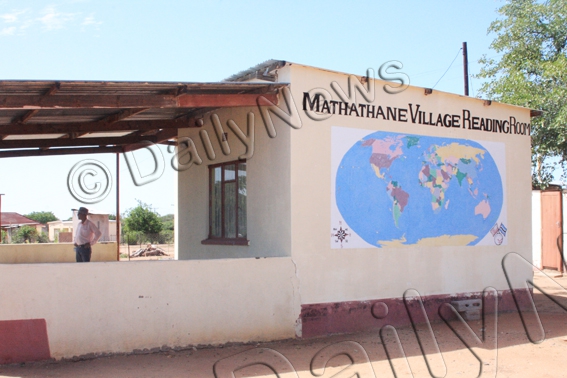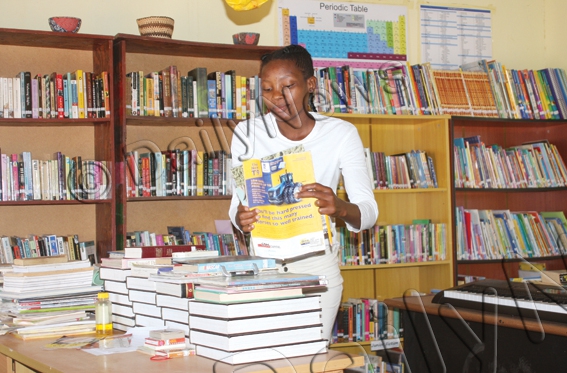Mathathane Reading Room
25 Mar 2020
Sharing a perimetre fence with the village kgotla, the nucleus of the village, stands a village fortress where clients read in peace and quiet.
On its wall and painted in bold blue reads, ‘Mathathane Reading Room.’ Anyone observant cannot miss the house in question.
What struck this reporter is not necessarily the building, but the idea of a reading room in Mathathane, a room that is unheard of in many villages bigger than the one in question.
It is a two-roomed, peach painted house standing conspicuously against the kgotla shelter to its north.
The room is electrified and air-conditioned. Inside what can be termed a reception room are computers lying idle because they have no cables to connect.
However, even when connected, the computers will not be connected to the Internet. Inside the other room are over seven shelves stacked with books ranging from adult literature to the chidren nine-years and under.
Some of the books are neatly packed on top of the tables owing to limited space inside the reading room.
Outside the facility is a shade boasting some concrete seating area where patrons take turns to engross in the books that the facility offers.
However, unlike most reading rooms within libraries where clients read in quiet and with minimum distraction, in Mathathane the reading is conducted outside owing to the limited space and shortage of furniture inside.
At the facility is one Ms Joyce Kololo, who despite tending to her young child, wakes up in the morning to render to the readers her all.
Though working as a Tirelo Sechaba beneficiary, Ms Kololo was trained by officials from Bobonong Library who then tested her for proficiency before she could be cleared to assume running of the facility.
Ms Kololo starts the daily business at 8am and wraps up her operations at lunchtime as per requirement of her engagement.
However, Ms Kololo is willing to go extra hours to cater for those that come after lunch hour.
In fact, she said buoyed by her passion she sometimes opens up to 6pm.
On a daily basis she registers books, packs them and registers those that come to the facility for literary indulgence. She noted that on a daily basis she registered between 110 to 130, majority of them primary school pupils while about 10 would be adults.
Adults, she said, usually want computer services which were not offered due to lack of connecting cables.
“Many clients are regular attendants and they know the drill in as far as acquiring books and returning them,” Ms Kololo said. She believes the reading room has impacted positively towards reading.
In fact, she found that even those who struggled with reading have improved tremendously.
The idea was conceived by American Peace Corps in 2014 because they wanted to improve the culture of reading, and the community was also thirsty for a reading culture in the village.
The VDC welcomed the idea and provided the two-roomed house.
The committee then elected one Mr Albert Legwaila, renowned for his badges in education, to captain the project to the desired heights.
Mr Legwaila, former chief education officer after ascending through the ranks in his professional life, is still the chairperson of the committee and much involved in the running of the facility that reportedly assists between 110-130 clients daily.
The committee chairperson, despite bearing a plethora of misgivings, harbours ideas of seeing the reading room graduating into a fully-fledged library for the communities of Mathathane, neighbouring farms and Mothabaneng, a few kilometres to the north of Mathathane.
Owing to challenges of funding, Mr Legwaila points out, the community applied to the government to assume running of the facility, but without success.
However, Mr Legwaila noted that Botswana National Library Services donated some books towards the reading room and partook in the official opening of the village project.
“We have some of the recent books that some of the libraries don’t have,” said Mr Legwaila who revealed that the facility was managed by two youths, one from Tirelo Sechaba and the other from Ipelegeng.
Since the two ‘librarians’ have limited operating hours, from 8am to lunchtime, Mr Legwaila and his committee are working on a plan to have it opened post lunchtime and closing at 6pm to allow for pupils to access the facility after school.
In fact, the library committee chairperson engages parents, especially to nudge their children into utilising the reading room for their educational development.
Another plan is to involve pupils from Badale Junior Secondary School on a voluntary basis, especially on weekends, days that pupils could have extended times to absorb contents of the books.
Mr Legwaila believes that by engaging pupils and opening the library to them would inculcate the culture of reading. He believes pupils should always read at their free times. ENDs
Source : BOPA
Author : Manowe Motsaathebe
Location : MATHATHANE
Event : Interview
Date : 25 Mar 2020







